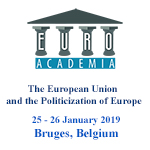Euroacademia Conferences
 Europe Inside-Out: Europe and Europeanness Exposed to Plural Observers (9th Edition) April 24 - 25, 2020
Europe Inside-Out: Europe and Europeanness Exposed to Plural Observers (9th Edition) April 24 - 25, 2020 Identities and Identifications: Politicized Uses of Collective Identities (9th Edition) June 12 - 13, 2020
Identities and Identifications: Politicized Uses of Collective Identities (9th Edition) June 12 - 13, 2020 8th Forum of Critical Studies: Asking Big Questions Again January 24 - 25, 2020
8th Forum of Critical Studies: Asking Big Questions Again January 24 - 25, 2020 Re-Inventing Eastern Europe (7th Edition) December 13 - 14, 2019
Re-Inventing Eastern Europe (7th Edition) December 13 - 14, 2019 The European Union and the Politicization of Europe (8th Edition) October 25 - 26, 2019
The European Union and the Politicization of Europe (8th Edition) October 25 - 26, 2019 Identities and Identifications: Politicized Uses of Collective Identities (8th Edition) June 28 - 29, 2019
Identities and Identifications: Politicized Uses of Collective Identities (8th Edition) June 28 - 29, 2019 The European Union and the Politicization of Europe (7th Edition) January 25 - 26, 2019
The European Union and the Politicization of Europe (7th Edition) January 25 - 26, 2019 7th Forum of Critical Studies: Asking Big Questions Again November 23 - 24, 2018
7th Forum of Critical Studies: Asking Big Questions Again November 23 - 24, 2018 Europe Inside-Out: Europe and Europeanness Exposed to Plural Observers (8th Edition) September 28 - 30, 2018
Europe Inside-Out: Europe and Europeanness Exposed to Plural Observers (8th Edition) September 28 - 30, 2018 Identities and Identifications: Politicized Uses of Collective Identities (7th Edition) June 14 - 15, 2018
Identities and Identifications: Politicized Uses of Collective Identities (7th Edition) June 14 - 15, 2018
Visual Identity and the Human Crisis in Errementari: The Blacksmith and the Devil
-
-

-
Presentation speakers
- Adriano Messias De Oliveira, Pontifícia Universidade Católica de São Paulo, Brazil / Universitat Autònoma de Barcelona, Spain
Abstract:
Films represent a complex symptomatology of our culture. In this scope, moving images go far beyond a tangle of signs that the Saussurean tradition linguistics has depreciated for decades. Instead, they are able to point out important aspects of our visual identities. In contrast, independent and authorial films are capable of communicating agglutinations and possibilities of identification, establishing dialogues among alterities. My proposal is based on a semiotic-psychoanalytic approach that seeks to understand how the expression of monstrous forms appear in Errementari: The Blacksmith and the Devil (Paul Urkijo, 2016), produced by Àlex de la Iglesia. At the same time, Urkijo’s work plays with references to the Iberian Middle Ages and presents a multiple conception of film genres through a strong Gothic aesthetic. There are inferences to Basque culture but also to Iberoamerican identities, in a wide manner, especially considering the irony towards religious and moral aspects. If one of the marks of the contemporaneity is the crisis of Humanism, this film demarcates, with its sense of humor, some of the biases of our grave ontological crossroad when proposing the figure of a devil, an old legacy, as highly humanized. Errementari’s plot takes place in the village of Álava after ten years of the first Carlist War, when a government commissioner investigates an event linked to a sinister blacksmith with the name of Patxi, a solitary inhabitant of a dark forest. Far beyond a rural and folkloric tale, the film offers a collection of detailed infernal creatures, evoking creations of Hieronymus Bosch and the late medieval references of Ambroise Paré: a grotesque portrait of meanness and human hypocrisy.
-
Related Presentations

The Media Reception of the Refugee Wave in the European Countries Outside the Schengen Area
- Gordana Tkalec
- Iva Rosanda Žigo













